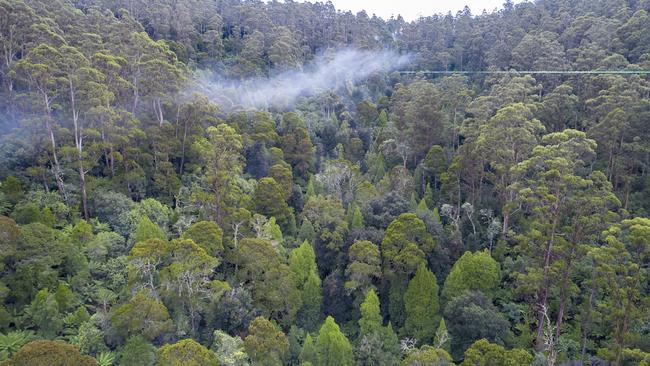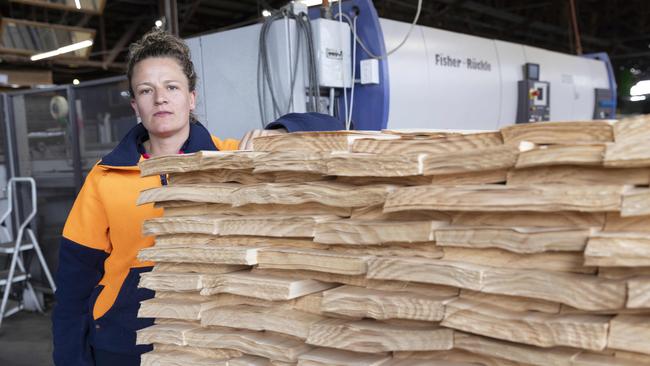Albanese faces forests fury over Bowen ‘win, win’ carbon credit coup to end native forest logging
A carbon credit scheme quietly backed by the federal government could succeed where decades of greenie campaigns have failed - and end native forest logging. But not without a fight.
Anthony Albanese faces a potentially damaging election stoush with timber workers, unless he reverses government backing for a “backdoor attempt” to end native forest logging.
Climate Change and Energy Minister Chris Bowen has accepted for “priority” development a new carbon credit method, pushed by NSW, which would pay states to “stop or slow down” harvesting of native forests.
Some conservationists hail the new carbon scheme as a “game changer” in their decades-long battle to end the native forest logging, and an “incredible opportunity” for states to cash in on a carbon offsets boom.
However, the native timber industry – already outlawed in Western Australian and Victoria – is outraged.
The Australian Forest Products Association is demanding the Prime Minister intervene to overturn Mr Bowen’s support to advance the scheme.
It cites Mr Albanese’s written 2022 election pledge that “a government I lead will not shut down the native forest industry”.
“Some in industry do believe this is a backdoor way to end native (forest harvesting),” association chief executive Diana Hallam said.
“The federal government decision to permit the development of this method is absolutely diametrically oppositional to the commitment that Mr Albanese made at the 2022 election not to close down native (forest harvesting).
“If you’ve made that commitment … then why on earth are you progressing with a method that would close it down? You can’t have it both ways.”
Expert analysis of the scheme, known as the Improved Native Forest Management (INFM) method, suggests NSW alone could reap up to $2.6bn over 15 years by ending logging of its native forests.
The method – one of four carbon credit options selected by Mr Bowen’s expert group for priority development, from 39 proposals – would also apply to Queensland and Tasmania, which, like NSW, continue to log native forests. Ms Hallam said support for the industry voiced by Mr Albanese and Forestry Minister Julie Collins had been “thrown in doubt” by the government’s backing for the INFM method.

“I know the Prime Minister supports his ministers being independently minded, but at some stage the buck stops with him,” she said.
A spokesman for the PM said he “absolutely stands by his commitment to the industry 100 per cent”, while Ms Collins shifted responsibility to the states.
“The Albanese Labor government is not changing policy when it comes to native forestry,” she said. “These are state forests and this is a decision for state governments. We support the communities and jobs that rely on this industry.”
As Mark Latham discovered at the 2004 election – when his forest protection policy triggered a blue-collar voter revolt – a perceived attack on forest jobs can be fatal to Labor’s prospects in regional marginal seats.
Mr Albanese visited key marginals in Tasmania this week, confirming Labor considered retaining Lyons and regaining Liberal-held Bass and Braddon, as key to victory. All three seats have strong timber-dependent communities, as do many in NSW.
At Britton Timbers’ veneer mill in Somerset, in the northwest Tasmanian seat of Braddon, workers such as Sarah Murfet are “proud” of their products.
“It’s the best job I’ve ever had, and I want to keep my job,” Ms Murfet said.
“My family and the rest of the team here want to know that silly decisions of politicians aren’t going to wreck our lives.”

Backers of the INFM method argue it is a “win-win”, providing jobs in forest management and funds to expand downstream processing of plantation timber, while meeting demand for carbon credits and reducing emissions.
“It could create a fundamental change in how we look after our forests,” said Lyndon Schneiders, executive director of the Australian Climate and Biodiversity Foundation. “This could be an incredible opportunity.
“Ultimately, it’s a going to be a decision for government. If forestry has been losing money for state forest managers for a very long time, then it is a reasonable proposition for state governments and treasuries to consider: is there a better commodity use here?
“Ninety per cent of all the wood that’s grown in Australia comes from plantations. Native forests is a very small and very controversial component – that now has an alternative commodity value in the form of carbon.”
Ms Hallam said NSW’s development of the INFM method undermined Premier Chris Minns’ stated commitment to native forestry.
And while Tasmania and Queensland remained supportive of the industry, it feared debt-laden state treasuries would sooner or later take the easy carbon money to shut it down.
“It would be very tempting to a cash-strapped government – here’s $1bn for you to grab and worry about the consequences later,” Ms Hallam said.
Tasmanian Liberal Resources Minister Eric Abetz said Tasmania would “not support the recent proposal by NSW Labor and supported by the federal Labor government to reward states for essentially locking up public native forests”.






To join the conversation, please log in. Don't have an account? Register
Join the conversation, you are commenting as Logout